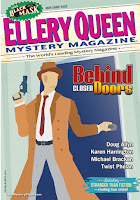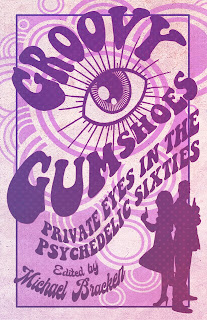 |
| The Boyz |
The long journey actually started on January 19th when MWA announced the six short stories nominated for the Edgar, but you've already heard about that from various people, so let's start this rendering of events on Tuesday, April 26th. Ready?
The airplane landed at LaGuardia, the wife and I took a $50 taxi ride into Manhattan and arrived at the Marriott near Times Square. Right off, I knew things were gonna be different.
I had never stayed at a hotel where the Lobby was on the 8th floor. The first obstacle to getting registered for a room was the giant revolving door on the ground floor, plus they must've had trouble paying the electric bill because the lights were dim in this particular area. I promptly got lost in the revolving door. In my defense, the door's pivot column had long slender mirrors on it, and with my failing vision, I should have never looked into the mirror. It was like being in the Fun House at the county fair and seeing no way out. With no regard for me or my large roller suitcase, the door marched on. I had no choice but to follow… until my wife reached in and rescued me.
Our room was very nice and there was a restaurant named Junior's right across the street where we ended up eating at least five of our meals while in residence.
On Wednesday afternoon, we attended the matinee performance of a Broadway play, Moulin Rouge. My wife had bought tickets months ago when I lost a bet on January 19th and then I had to agree that yes, since I had been nominated for an Edgar, we could go back to New York City one more time. And, here we were. The music, the cast, the stage settings were excellent. The audience gave a standing ovation at the conclusion.
Even the intermission was entertaining. I fought my way through the mass of bodies crowding into the refreshment lobby as they pursued quantities of popcorn and glasses of wine. At my advancing age, I instead went for the line headed to the Men's Room. A couple of people behind me, this is what I heard.
 |
| David, Liz & R.T. at DELL Reception |
Attendant: "Ma'am, where are you going?"
Woman: "I am in the line."
Attendant: "But that's the line to the Men's Room."
Woman: "I am in the line."
She must've won the philosophical discussion, because for several minutes afterwards, I could hear her voice behind me, all the way in.
That evening, we dined at Junior's for the second time. As the hostess wound her way through the restaurant to show us to a table, Michael Bracken recognized Kiti and me and called us over to his table. The hostess, not realizing she had lost her cargo, continued all the way to the back of the restaurant.
 |
| 2022 Edgar Nominees for Best Short Story |
Michael graciously introduced us to his wife Temple, his co-author nominee James Andrew Ahearn and his wife Dawn, and to Stacy Woodson. We all conversed until the hostess made her way back to us and asked if we would like a closer table.
Thursday afternoon was the DELL Publishing (AHMM & EQMM) Publishing Cocktail Reception at a nearby library, which Liz has already written about quite well.
At 6PM that evening was the MWA Nominee Cocktail Reception at the Marriott. Here all the nominees got their group photo taken by the category they were in. At 6:30 PM, the Edgar Banquet Cocktail Reception began, and at 7:25, the doors opened for admittance into the room for the Edgar Award Banquet itself.
 |
| R.T., Edgar & James |
At Table #1 were Linda Landrigan, Kiti, myself, Brendan DuBois, Michael Bracken, Temple, James Andrew Ahearn, Dawn and two ladies from DELL Publishing, Chris Bagley and Abby Browning. Chris bought a $53 bottle of red and a $53 bottle of white wine for the table, and I do thank her for the very good libation.
All too soon, the presenters went to the podium, the nominated stories and the names of their authors and publications were flashed up on the large screens up front, and the name of the winner in each category was then announced. When they called my name, Kiti suddenly had tears running down her cheeks, Brendan pounded me on the back in congratulations and I gradually realized I was supposed to stand up and go somewhere.
Having spent most of the 25 years of my federal law enforcement career operating in the shadows, I have not been comfortable in the spotlight, yet the light had found me. Fortunately for everyone else, I had a typed copy of my acceptance speech, just in case. Be Prepared was the motto in my youth.
Actually, I had two copies in my suit coat pocket, one in 18 point font and one in 20 point font, figuring that depending upon how much light there was at the podium, I would be able to read one of them. The rest of the night was spent in conversation with various attendees, and then it was midnight and back to the room.
Friday was tourist day, Times Square and Central Park in the cold wind and low temperatures. Don't know how Naked Singing Cowboy keeps his teeth from chattering. We saw homeless people in layered clothing who appeared to be colder than he was. Don't know if he is the same Naked Singing Cowboy we saw working Central Park years ago. If he is, then he must really love his job. Since our legs and feet were now tired, we hired one of those three-wheeled-bikes-with-a-cab-for-two-people-on-the-rear for a ride back to the hotel and supper at Junior's for one last time.
Early Saturday morning, Kiti wrapped and packaged Edgar in a MWA canvas bag and hand-carried him to avoid breakage on the flight home. A $50 taxi ride put us back at LaGuardia. When Edgar rode the conveyor belt through the x-ray machine, TSA took us over to a private table. Then the TSA guy removed Edgar from the bag, unwrapped him and swabbed him down for explosives, while Kiti kept trying to explain he was an award. All the TSA guy could say was, "Lady, keep your hands off the bag." I sneaked a peek at the x-ray screen, and yep, Edgar did kinda look like a warped bomb in all that packing. We did make it all the way home and now Edgar sits on the computer desk with his little brother, Bobblehead.
Oh New York, New York, you are an experience, entertaining, but expensive.
I told Kiti we couldn't go back again unless I got nominated for an Edgar.
Of course, you see how that turned out the last time I said the same thing.
Who knew?
















 This has been an awful week for me personally. After hearing about the death of always creative and funny icon Robin Williams and all that sadness entailed, we hear about the death of the beautiful Lauren Bacall. Of course, there was a big difference. Age for one thing, Betty Bacall was eighty-nine years old and had lived a full and I imagine a reasonably happy life. Her great love was Humphrey Bogart and by all accounts their marriage was happy and fulfilling. Although it was cut short by his early death.
This has been an awful week for me personally. After hearing about the death of always creative and funny icon Robin Williams and all that sadness entailed, we hear about the death of the beautiful Lauren Bacall. Of course, there was a big difference. Age for one thing, Betty Bacall was eighty-nine years old and had lived a full and I imagine a reasonably happy life. Her great love was Humphrey Bogart and by all accounts their marriage was happy and fulfilling. Although it was cut short by his early death.
